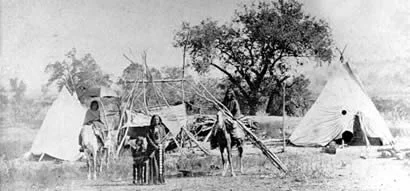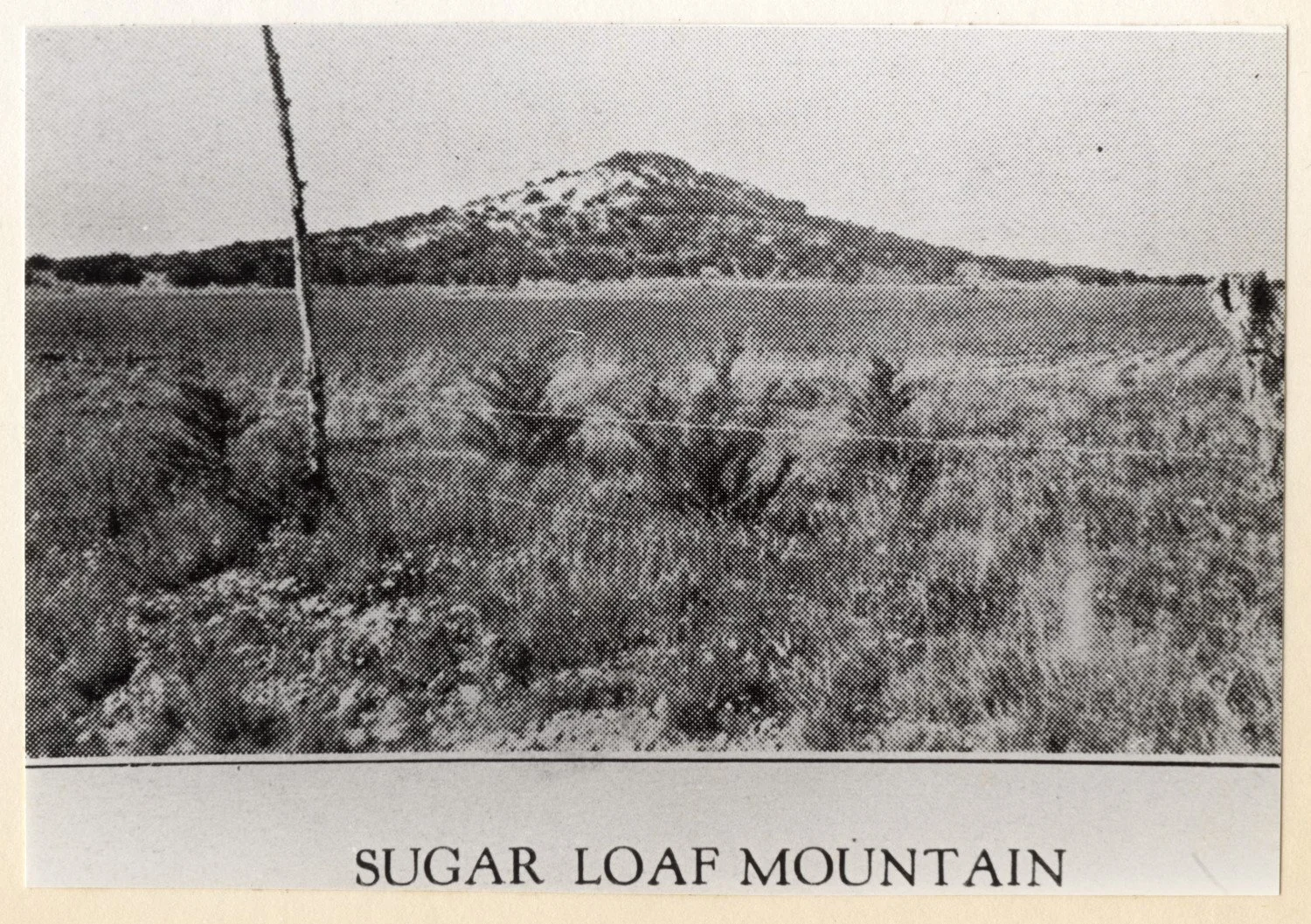Tonkawa Indians, as drawn during the 1828 Berlandier expedition.
Tonkawa Village near Fort Griffin
Tonkawa Chief Johnson
Tonkawa Chief Grant Richards
The Tonkawa Tribe of the El Camino Real and Red Mountain
by Bob O’Dell, producer Sugarloaf Pictures
At 497 feet above sea level, one of the highest points in Milam County, stands a hill that prominently overlooks the Little River and Brazos River valleys with views of up to fifty miles. Known as Sugarloaf Mountain for well over the last one-hundred years, its much older name, Red Mountain, holds a special place in the history of an indigenous people group known today as the Tonkawa Tribe.
The Tonkawa Tribe, currently located near the town of Tonkawa, Oklahoma north of Oklahoma City is the only federally recognized tribe in the nation that claims to have originated from what is now the State of Texas. According to the tribe’s history passed down orally for generations, the Tonkawa Tribe originated in Central Texas at the base of Sugarloaf Mountain, known by the tribe as Red Mountain, or Naton Samox in the Tonkawa language. The official Tonkawa seal includes this Red Mountain in front of the rising sun, behind their water bird.
The geology of Red Mountain is unique, being the only well-formed stand-alone hill of its type in Central Texas formed out of the Reklaw formation of the Tertiary Eocene period. It overlooks the Little River, which gathers all the fresh spring water flowing out from the Edwards plateau from Round Rock (near Austin) all the way northward to Troy (near Waco). All the streams in this area were referred to collectively by the Tonkawa as the land of good water.
Red Mountain is also located along a major indigenous trail that connected the eastern tribes in what is now Louisiana, to the southern tribes in what is now South Texas and Mexico. This put the Tonkawa along one of the most important trade routes in North America. When the Spanish first explored Central Texas in the early 1700s, they used these indigenous trails, giving them their own names like The San Antonio Road that connected San Antonio to Nacogdoches, and calling the full span of that same trail network, El Camino Real, The King’s Highway. Highway 79 through Rockdale retraces one of the major segments of El Camino Real, passing close to Red Mountain near Gause.
The fact that no Spanish document recorded a sighting of the Tonkawa tribe at Red Mountain is explained both by its sacred use, and by the lack of flowing spring water at the base of the mountain. However, Spanish records clearly mention a large aggregation of Indian campsites they Rancheria Grande (the big ranch), just two miles from Red Mountain. That major site, including the Tonkawa and its affiliated tribes like the Ervipiame, Mayeye, and Yojuanes, along both banks of Alligator Creek and Pin Oak Creeks. Was possibly the largest documented campsite in all of Spanish Texas.
Rancheria Grande was a home for Tonkawa-associated Tribes since it was first discovered by the Spanish in the early 1700s. Most all of the tribes that eventually folded into the Tonkawa tribe, were known to be living at Rancheria Grande during most of the 1700s. In fact, up to twenty-two tribes were at one time reported to be living together peacefully at Rancheria Grande. Red Mountain, holding great spiritual significance and close by, would have been a gathering place for sacred celebrations. In the mid-1800s, a few Texans were invited by the Tonkawa to watch their secret wolf dance, re-enacting the Tonkawa creation story at the base of Red Mountain.
On December 12, 2023 the Tonkawa Tribe purchased its sacred Red Mountain from Texas landowners Leon and Kay Herzog. Given the mountain’s proximity to the El Camino Real, the tribe fittingly signed an agreement with the El Camino Real de los Tejas Historical Trail Association (ElCAT) to handle the day-to-day management of the site, and to develop a publicly accessible park for enjoyment of all, including preservation and education about the site.
Known as La Tortuga by the Spaniards, Sugarloaf Mountain of Milam County was originally named Naton Samox - or Red Mountain - by the Tonkawa.
The Tonkawa Tribe recently purchased Red Mountain from land owners.
Learn More About the Tonkawa
An upcoming documentary called Tonkawa: They All Stay Together, is currently in development and follows the life of the Tonkawa Tribe over two years, as they work to firmly secure their independence and prowess as a first nation in modern society. The movie celebrates the Tonkawa’s history as well as its most recent accomplishment of purchasing their ancient tribal sacred place Naton Samox — translated as Red Mountain — which is has been known for the past 100 years as Sugarloaf Mountain.
The Tonkawa are working to preserve, rediscover, and redefine who they are as a Tribe historically, culturally, and socially. By staying together in the midst of their challenges, this once powerful tribe seeks to secure their culture and relevance, not only today but well into the future.
Tonkawa: They All Stay Together is to be released in 2025.
Special Thanks to the
Grant Makers and
Patrons of the Arts
for providing
funding support for the
Heritage Celebration at The 1895!
This historical essay and related mural is made possible in part through a grant from:
The National Trust for Historic Preservation - Preservation Services Grant
City of Rockdale - Hotel Occupancy Tax Grant for Promotion of the Arts
Texas Rural Communities Grant
Texas Historical Foundation - Jeanne R. Blocker Memorial Fund Grant
Texas Brazos Trail Region Grant
Riot Platforms Community Grant
And a generous donation from the following Patrons of the Arts:
Oncor Electric







